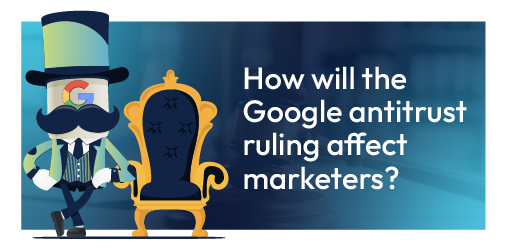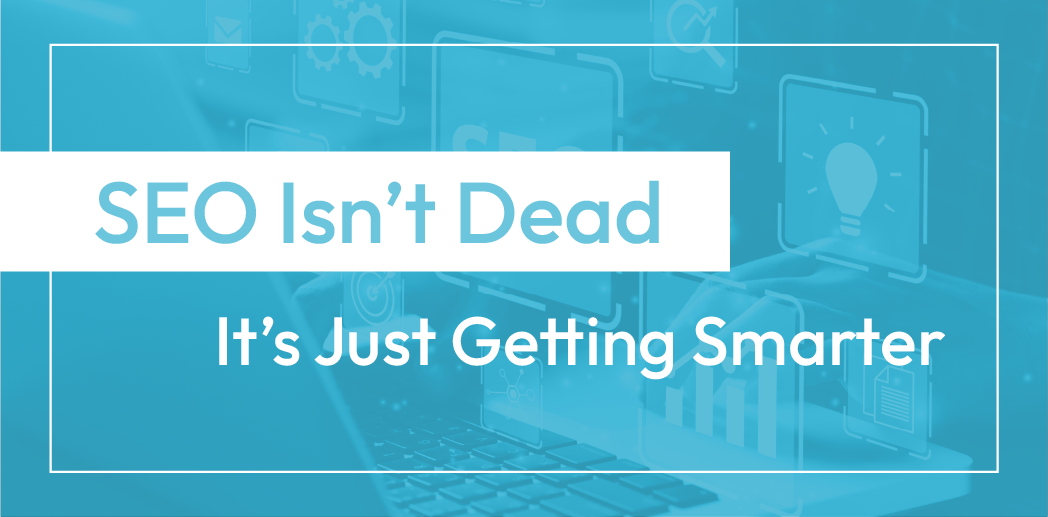How will the Google Antitrust Ruling Affect Marketers?
“Do Not Pass Go, Do Not Collect $200”
Google’s Monopoly on Trial
Google’s monopoly ruling could disrupt search and digital marketing, altering how businesses attract customers and compete online. If regulators force Google to change its search practices, the impact could include shifting ad costs, evolving SEO strategies, and new competitors gaining traction.
Key Takeaways:
- Google’s Monopoly Status: A federal court ruled that Google maintained its dominance unfairly, primarily through exclusive agreements that made it the default search engine on most devices.
- Potential Changes: The government may enforce measures like banning exclusive deals, requiring Google to share data, or even forcing the sale of Chrome. These changes could impact search rankings, advertising costs, and user behavior.

- SEO & Paid Search Disruptions: If search habits change and competition increases, businesses may need to optimize for multiple search engines, adjust ad spending, and focus on first-party data collection.
- New Search Competitors: Bing, DuckDuckGo, and AI-driven search engines may gain users if Google loses its default status, requiring businesses to diversify their marketing strategies.
- Preparing for the Future: Marketers should invest in multi-platform SEO, explore alternative ad networks, and strengthen direct customer relationships to stay competitive.
Google’s monopoly ruling could disrupt search and digital marketing, changing how businesses attract customers and compete online. If the tech giant’s grip on search weakens, it could open the door for new competition, shifting ad costs, SEO strategies, and how businesses reach customers online. As the digital space adjusts to new regulations and rising competitors, businesses need to rethink their strategies to maintain visibility and growth. However, one thing is for certain, with stakes this high and an uncertain future, businesses and marketers who pay attention now will be the ones who come out ahead.
Why Google’s Monopoly Matters
How Is Google a Monopoly?
For years, Google has been the gatekeeper of search, deciding what people see when they type in a query. But in 2023, a federal judge ruled that Google had unlawfully maintained this dominance, giving the government the green light to take action.
The issue? For years, Google secured its dominance through exclusive, multi-billion-dollar deals with major tech companies like Apple, Samsung, and Mozilla. These agreements made Google the default search engine on smartphones and web browsers, ensuring that most users never had to choose.
Beyond that, Google paid billions of dollars for prime search placement, effectively blocking rival search engines from gaining traction. In 2021 alone, Google spent $26.3 billion to maintain these deals, creating a system where even if a competitor built a better search engine, they would struggle to get in front of users.
The result? The Justice Department argued that this behavior was anti-competitive because it stifled innovation in search and limited consumer choice. Without real competition, there was little incentive for new players to enter the market, and consumers had fewer choices by default.
Google, of course, defended itself, claiming that users choose its search engine because it’s the best, not because they’re forced to. But the court saw things differently, ruling that these tactics went beyond fair competition and into monopoly territory. Now, regulators must decide how to undo the imbalance Google created.
So now, here we are. The ruling is in, and Google’s search monopoly is in the hot seat. The court’s decision on how to break it up could reshape how businesses get found online, how ads are bought, and how search itself works. And if history has taught us anything, it’s that when the biggest player is forced to play fair, the entire market shifts. The question is: who's ready for it?
The Uncertain Road Ahead
Google’s legal battle is far from over, and the road forward is filled with unknowns. The government has proposed sweeping changes, including:
- Forcing Google to sell Chrome to reduce its control over web browsing.
- Banning exclusive search agreements that automatically set Google as the default engine.
- Requiring Google to share search data with competitors for a decade.
The court is set to hear arguments in April 2025, with a final ruling expected by August. However, even after the court’s decision, Google will likely appeal, meaning the legal battle could stretch even further. Businesses and marketers should prepare for potential shifts but also expect a drawn-out process before any drastic changes take effect.
For marketers, this is a moment of uncertainty. If search rankings get reshuffled, will top-performing pages suddenly drop? If Google Ads pricing changes, will businesses see their costs rise—or fall? And if new search players emerge, will Google still be the first (and only) place brands need to optimize for?
What Marketers and Businesses Should Be Asking
Are search rankings about to change?
If Google is forced to adjust its algorithm or share data with competitors, could rankings be affected?
Will advertising costs rise or fall?
A more competitive search market could change ad pricing structures. Will it become more affordable (or more expensive) to reach customers?
Could new search engines gain traction?
If Google’s influence weakens, alternative search engines might attract more users. Should businesses start optimizing for Bing, DuckDuckGo, or AI language models, like ChatGPT?
How should marketing strategies evolve?
Does this mean a greater focus on owned channels like email and social media? Should businesses invest more in organic content to reduce reliance on paid search?
Is Google still the best place to reach customers?
If search habits shift, businesses must be ready to meet their audience wherever they go, even if that’s outside of Google’s ecosystem.
What Could Change for Businesses & Marketers?
Pending the court’s ruling – If the courts force Google to change its business practices, the ripple effects could touch everything from search rankings to advertising costs. Marketers who have long relied on Google as the primary way to reach audiences may need to rethink their strategies. The competitive field could open up, ad pricing structures may shift, and new players might enter the search market.
Search Engine Defaults & Competition
For years, Google’s exclusive agreements with Apple, Samsung, and other tech giants have made it the automatic search engine on billions of devices. If those contracts are banned, people may be given a choice instead of having Google set as the default. This could create opportunities for competitors like Bing, DuckDuckGo, and Yahoo, while also opening the door for entirely new search engines to gain traction.
More competition means businesses may need to optimize for multiple search platforms instead of focusing solely on Google. Each engine has its own algorithm, which could lead to variations in rankings and visibility. Marketers who have spent years fine-tuning their SEO strategies may need to rethink their approach, learning how different search engines prioritize content. If consumer behavior shifts and people start exploring alternative options, businesses that adapt quickly will have a better chance of maintaining their visibility.
Google Ads & Paid Search Costs
If Google’s monopoly weakens, its advertising model could look very different. Right now, Google’s dominance allows it to set the rules for paid search, dictating how businesses bid on keywords and how much they pay for visibility. Increased competition could either drive costs down as advertisers have more options or raise them if the battle for top placements becomes more intense across multiple platforms.
A shift in ad pricing would impact businesses of all sizes. Companies that have depended on predictable costs per click may see fluctuations, requiring them to rethink their budgets. Marketers will need to pay close attention to emerging ad networks and consider whether diversifying their paid search efforts across multiple platforms could provide better returns.
Data & Privacy Regulations
One of Google’s biggest advantages has been its ability to collect massive amounts of user data, helping businesses target ads and personalize experiences. If the courts impose restrictions on how Google collects and shares data, the entire marketing industry could feel the effects. Businesses that rely on Google’s insights for ad targeting and audience segmentation may need to find new ways to reach the right people.
Privacy-focused competitors like DuckDuckGo have already positioned themselves as alternatives that don’t track users. If more consumers move toward privacy-first search engines, businesses that rely on third-party tracking could see their strategies become less effective. First-party data, the information companies gather directly from their own customers, will become even more valuable. Businesses that invest in building direct relationships with their audience through email marketing, loyalty programs, and on-site engagement will be in a stronger position.

The Future of Google Chrome & AI Investments
Google’s Chrome browser plays a major role in how people search, track data, and interact with online advertising. If the courts require Google to sell Chrome, it could separate search from one of its most powerful tools for collecting user behavior data. This could change how search engines gather information, how advertisers track users across the web, and how businesses measure their marketing performance.
At the same time, AI is becoming an increasingly important part of search. Google’s AI-driven tools, like Gemini, are designed to enhance search results, summarize information, and even predict what users are looking for. If Google is forced to separate its AI efforts from search, it could change how results are generated, potentially creating space for competitors, like Co-Pilot or Grok, to innovate in AI-powered search. Businesses that rely on search traffic may need to adjust their content strategies if AI-generated summaries reduce the number of traditional search clicks.
Once the final judgment is passed in August, businesses may have to rethink how they attract customers. Search and advertising strategies that once felt reliable may no longer deliver the same results. Instead of depending on a single platform, companies will need to explore new ways to reach their audience, by either optimizing for multiple search engines, adjusting paid media strategies, or relying more on direct customer relationships.
How to Stay Ahead
While the details of the ruling are still being decided, one thing is clear: businesses that rely too heavily on Google need a new plan. Search habits may change, competition could rise, and traditional strategies might not deliver the same results. The best way forward is to stay flexible, diversify marketing efforts, and focus on long-term strategies that don’t depend on a single company’s dominance.
Diversification Is Key
For years, businesses have treated Google as the starting and ending point of online visibility. That approach is becoming riskier. If new search engines gain market share, companies that put all their efforts into ranking on Google could struggle to stay visible.
Instead of relying on a single platform, businesses should start testing other options. Bing, DuckDuckGo, and Yahoo have been waiting for an opportunity to grow, and if Google’s monopoly weakens, more people may start using them. Investing in SEO for multiple search engines could provide an edge.
However, search is only part of the equation. Social media advertising has become an increasingly effective way to reach potential customers, and as platforms like TikTok, LinkedIn, and Instagram refine their ad targeting, businesses that explore these options may see strong returns.
Content marketing also plays a role. Brands that build an audience through valuable, engaging content on their own channels, like
email newsletters and
podcasts, won’t be as dependent on search engines to attract traffic.
SEO in a Post-Google Monopoly World
Google’s search algorithm has set the standard for years, but if competition increases, ranking factors could become less uniform across different search engines. Businesses that want to stay visible need to be ready for a less centralized search experience.
This could mean adapting to multiple ranking systems, each with its own way of prioritizing content. Some search engines may focus more on user privacy, others on AI-driven summaries, and some on traditional keyword relevance. Marketers who start analyzing search behavior beyond Google will be better positioned to make the right adjustments.
At the same time, owning high-quality content will matter more than ever. If rankings become less predictable, businesses that consistently publish valuable, authoritative content will have a better chance of attracting visitors across multiple platforms.
Paid Advertising: Rethinking Budgets & Platforms
If Google’s advertising stronghold weakens, ad costs could fluctuate. Increased competition might lower prices on Google Ads, but it could also lead to a bidding war across multiple platforms, driving costs up in unexpected ways. Marketers who take a wait-and-see approach may find themselves paying more to compete.
A smarter move is to start testing alternative ad networks now. Microsoft Advertising already offers a strong alternative to Google’s search ads, and social media platforms provide highly targeted advertising opportunities. Investing in a mix of search, social, and programmatic advertising can help businesses avoid overpaying for clicks in any single channel.
The Power of First-Party Data
If Google is forced to change how it collects and shares data, businesses that rely on third-party tracking could struggle to reach their audience as effectively. Meaning, that one strategy will remain untouchable. Building direct relationships with customers.
First-party data, collected through email subscriptions, CRM systems, and customer loyalty programs, will become more valuable. Businesses that invest in strong customer connections now will have a competitive advantage later. Encouraging visitors to sign up for newsletters, engage through loyalty incentives, and interact directly on owned platforms can reduce reliance on external algorithms and ad networks.
Marketers who take action now, expanding beyond Google, preparing for multiple search engines, and strengthening customer relationships, will be in the best position to succeed, no matter how the search market evolves.
The Bottom Line
Change is coming, but businesses that stay adaptable will find new opportunities where others see obstacles. Businesses that diversify search strategies, explore new advertising platforms, and strengthen direct customer relationships now will likely gain a significant advantage in the future.
That’s where RivalMind comes in. As experts in SEO, paid search, and
digital strategy, we help businesses navigate uncertainty and turn disruption into opportunity. Whether you need to future-proof your rankings, optimize for emerging search platforms, or refine your marketing strategy, our team is ready to guide you every step of the way. Contact RivalMind today and build a strategy that thrives in the next era of search.
Looking for more organic website traffic?
Welcome to RivalMind. Our purpose is to help your business thrive. We are a digital marketing agency that offers SEO, PPC, Web Design, Social Media and Video Solutions as tools to our clients for online business development and growth.
Contact us today to get started!
Blog Contact Form
Connect with Us:




